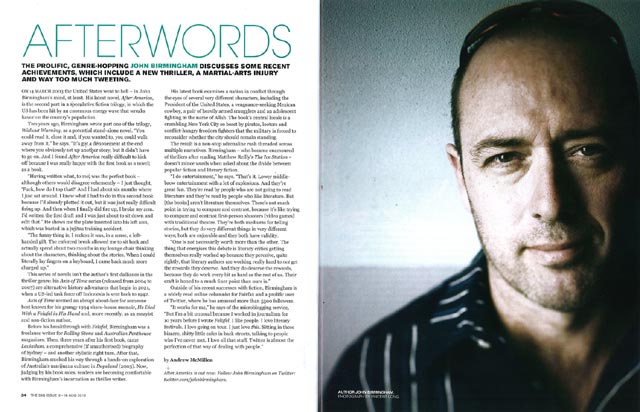The Big Issue story: John Birmingham – ‘After America’, August 2010
A story for The Big Issue #360 (3-16 August 2010), wherein I profiled Brisbane-based author and journalist John Birmingham and his new book, After America.
Click the image below for a closer look at the scanned article, or read the text underneath.
Afterwords
The prolific, genre-hopping John Birmingham discusses some recent achievements, which include a new thriller, a martial-arts injury and way too much tweeting
On March 14, 2003, the United States Of America went to hell – in John Birmingham’s mind, at least. His latest novel, After America, is the second part in a speculative fiction trilogy based in a USA subject to an enormous energy wave that decimated the majority of the country’s population.
Two years ago, Birmingham wrote part one of the trilogy, Without Warning, as a potential stand-alone novel. “You could read it, close it, and if you wanted to, you could walk away from it,” he says. ”It’s got a dénouement at the end where you obviously set up another story, but it didn’t have to go on. And I found After America really fucking difficult to kick off because I was really happy with the first book as a novel; as a book.”
“Having written what, to me, was the perfect book – although others would disagree vehemently – I just thought, “Fuck, how do I top that?” And I had about six months where I just sat around. I know what I have to do in this second book because I’d already plotted it out, but it was just really difficult firing up. And then when I finally did fire up, I broke my arm. I’d written the first draft and I was just about to sit down and edit that.” He shows me the plate inserted into his left arm, which was busted in a Jujuitsu training accident.
“The funny thing is I reckon it was, in a sense, a left-handed gift. The enforced break allowed me to sit back and actually spend about two months in my lounge chair thinking about the characters, thinking about the stories. When I could literally lay fingers on a keyboard, I came back much more charged up.”
This series of novels isn’t the author’s first dalliance in the thriller genre: his Axis Of Time series (released from 2004 to 2007) are alternate history adventures that begin in 2021, when a US-led task force off Indonesia is sent back to 1942.
Axis Of Time seemed an abrupt about-face for someone best known for his grungy 1994 share-house memoir, He Died With A Felafel In His Hand and, more recently, as an essayist and non-fiction author.
Before his breakthrough with Felafel, Birmingham was a freelance writer for Rolling Stone and Australian Penthouse magazines. Then, five years after his first book, came Leviathan, a comprehensive (if unauthorised) biography of Sydney – another stylistic right-turn. After that, Birmingham smoked his way through a hands-on exploration of Australia’s marijuana culture in Dopeland (2003). Now, judging by his book sales. readers are becoming comfortable with Birmingham’s incarnation as thriller writer.
His latest book examines a nation in conflict through the eyes of several very different characters, including the President of the United States, a vengeance-seeking Mexican cowboy, a pair of heavily-armed smugglers and an adolescent fighting in the name of Allah. The book’s central locale is a crumbling New York City so beset upon by pirates, looters and conflict-hungry freedom fighters that the military is forced to reconsider whether it should remain standing.
The result is a non-stop adrenaline rush threaded across multiple narratives. Birmingham – who became enamoured of thrillers after reading Matthew Reilly’s The Ice Station – doesn’t mince words when asked about the divide between popular fiction and literary fiction.
“I do entertainment,” he says. “That’s it. Lower middle-brow entertainment with a lot of explosions. And they’re great fun. They’re read by people who are not going to read literature and they’re read by people who like literature. But [the books] aren’t literature themselves. There’s not much point in trying to compare and contrast, because it’s like trying to compare and contrast first person shooters with traditional theatre. They’re both mediums for telling stories but they do very different things in very different ways; both are enjoyable and they both have validity.”
“One is not necessarily worth more than the other. The thing that energises this debate is literary critics getting themselves really worked up because they perceive, quite rightly, that literary authors are working really hard to not get the rewards they deserve. And they do deserve the rewards, because they do work every bit as hard as the rest of us. Their craft is honed to a much finer point than ours is.”
Outside of his recent successes with fiction, Birmingham is a widely read online columnist for Fairfax and a prolific user of Twitter, where he has amassed more than 5,500 followers.
“It works for me,” he says of the microblogging service, “But I’m a bit unusual because I worked in journalism for 10 years before I wrote Felafel. I like people. I love literary festivals. I love going on tour. I just love this. Sitting in these bizarre, shitty little cafes in back streets, talking to people I’ve never met. I love all that stuff. Twitter is almost the perfection of that way of dealing with people.”
by Andrew McMillen
After America is out now. Following John Birmingham on Twitter: twitter.com/johnbirmingham
Naturally, it was a blast to speak with one of my favourite writers for the first time. (It also helped that I’d finished reading an advance copy of After America half an hour before we met, so the story was fresh in my mind.)

 In June 2009, The Music Network published my first commissioned article. It was the first in a five-part series called ‘For The Record’, a retrospective feature on the album format and whether it’s still relevant. Start with part one
In June 2009, The Music Network published my first commissioned article. It was the first in a five-part series called ‘For The Record’, a retrospective feature on the album format and whether it’s still relevant. Start with part one